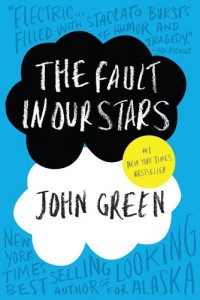Earlier this year I read a lovely young-adult novel, called The Fault in Our Stars. I had some trouble vocalizing my feelings on the novel and its subject matter, but for some reason this one really stuck. Since then I’ve read two other John Green novels but it is this one that continues to simmer and bake in the back of my mind. And now I am finally sitting down to write about it in hopes of figuring out why I care so much.
For most of my life I have really disliked cancer books, just as the main cancer-afflicted heroine of TFiOS seems to. The reasons are obvious–most cancer books, especially those written for children or teens, are overly sentimental (not to mention tear-jerking), highly romanticized, overlong, and neatly summed up into “but love cures all” or some sort of Moral of the Story. It was infuriating to read. The Lurlene McDaniel novels about chronic disease had been highly addictive for me in middle school but as I grew a little older, I realized how futile these novels were. They were worthless to me, in every possible way. And I couldn’t figure out why.
John Green’s tremendous novel certainly was not worthless to me. I read it back in January of 2012, and for some reason I haven’t been able to really even think about it much until now. Perhaps it was because I did not want to admit to loving a “cancer book,” which I’ve detested for so long. And perhaps I was embarrassed to even contemplate the idea of being so affected by a young-adult novel. But then, that is a stupid notion because really, I am just as affected by other novels written for a similar age range, such as Kristin Cashore’s equally beautiful Fire, and of course the entire Harry Potter series.
So perhaps I enjoyed TFiOS so much because it transcends its genre, or at least I’d like to think so. It is speaking to us about the basic sadness of the human condition, of things that happen in life that break us down and make us think about the very meaning of life. Sad stories aren’t inherently more profound; at least, I don’t think so. So why are we drawn to tragedy and sad things and all the angst in the world?
Lev Grossman and John Green touch upon this in their panel together at the Los Angeles Times Festival of Books 2012. I quite agree with Green when he said that (and I’m not quoting exactly) sadness in books like this are necessary. I think that there is a sort of need in the human condition that seems to draw us to sadness. Books that are sad are not inherently more profound, but perhaps because it is the saddest things in life that make us think and reflect, looking for meaning in the ordinary and in the extraordinary. We look for meaning in our sadness.
This novel speaks to us because of, as Lev Grossman put it in his TIME magazine review, “the pleasures and consolations” that we are seeking from fiction (I really like the way he put that). Sad stories like this are important and needed because we as humans desperately seek to find meaning in our sadness. The Fault in Our Stars is brilliant in that way because it is brutally honest in its characters’ search for greater meaning.
Hazel and Gus are refreshingly straightforward, honest, unafraid to feel… and they unapologetically look for meaning even as they make light of situations that they might not know how to cope with (and who does?). This is what makes them so lovable and why we take these fictional teenagers into our heart, where they become real to us. TFiOS works because Green has tapped into genuine human feelings, rather than generated ones designed to tear-jerk and create all the feels. But in tapping into genuine feelings that are universal to anyone who’s ever been through, you know, a Really Sad Thing (i.e. pain, loss, disease, etc), he has created something extraordinary that transcends its genre both as a young-adult novel and as a “cancer book.”
And in that kind of honesty we find consolation. In characters like Hazel, we find a heightened and stylized but never over-dramatized set of real feelings to deal with, and that is what made this novel work so well for me.
All in all, these are the thoughts that have been simmering in the back of my mind regarding John Green’s very excellent and compelling novel, The Fault in Our Stars
John Green’s site: http://johngreenbooks.com/the-fault-in-our-stars/
Lev Grossman TIME review: http://www.time.com/time/magazine/article/0,9171,2105454,00.html#ixzz20BnJZ5mo
John Green and Lev Grossman at the LA Times Book Festival: http://www.youtube.com/watch?v=3hieuuwew7U
